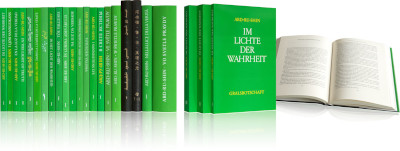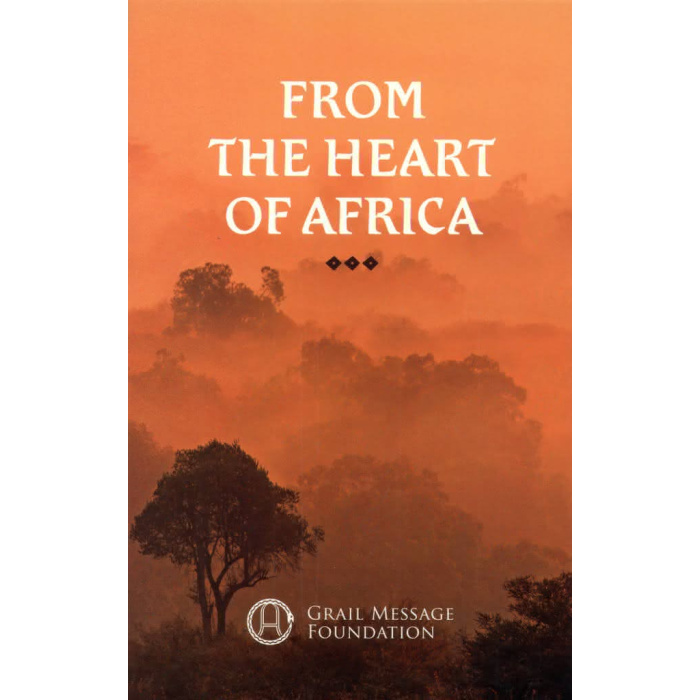From the Heart of Africa
DE: 1-3 ngày làm việc, các quốc gia khác: 5-30 ngày làm việc
In the “Book Series of the Grail Message Foundation”, the volume “From Past Millennia” depicts the life of Moses and the life of Abd- ru-shin during his first earthly existence. The lives of both men are linked with events at that time, when the people of Israel went out from their serfdom in Egypt into the Arabian desert, to the Sinai Mountains, where they received the Commandments of God as the guiding principle of their future life.
The narrative “In the Heart of Africa” falls into that period. It gives an account of the spiritual awakening of a small chosen tribe in the heart of Africa, up to their encounter with Abd-ru-shin, who was dwelling on earth at that time in the person of an Arabian prince in preparation for his Mission. In completing this Mission Abd-ru-shin was incarnated on earth for the second time in our era, in the person of the Bringer of the Grail Message, “In the Light of Truth”.
People living near him, called to do so through a special gift, wrote down what they were allowed to see spiritually of the great happenings that decisively marked the development of-mankind, from the beginnings in prehistoric times (Hjalfdar), through China (Lao-Tse), Iran (Zoroaster), India (Buddha), Arabia (Mohammed), down to our time.
Their accounts are reproduced in the “Book Series of the Grail Message Foundation”.
These accounts are supplemented by the present narrative.
Brown shapes flitted around the fire, whose reddish flicker lit up only a small area of the valley.
It shone on a rampart of thorn-bushes the blossoms of which were about to open for the night, and were sending out a sweet fragrance that attracted large multi-coloured moths. They hovered about the blossoms with a gentle humming.
But the people who crowded to the fire to get a good place neither saw nor sensed the beauty. They had no eye for it anyway. Whatever attracted their attention had to be coarser and larger.
Now there seemed to be a certain excitement in the pushing and crowding. They were squatting on the ground in a dense circle, so that their brown half-clad bodies touched each other without their being conscious of it. They were not used to anything else.
Their eyes were avidly fixed on the large hunk of meat which was slowly roasting over the fire. The juice dripped down into the flames and sent out a sharp smell of burning that destroyed all the scents round about.
The dripping ceased, a brown crust formed on the roast. Lips began to smack, red tongues hastily licked them in a foretaste of the enjoyment to come.
On one side two women were pouring goat’s milk into many small clay bowls, no two of which were alike. They were products from the hands of the women of the tribe. Each of the women had a different way of deco- rating her pottery. They took pride in always thinking out something new.
Now they had finished their work, which was done in silence, with languid movements. At the same time, an increased smacking of lips indicated that the food was ready.
At a shrill call from the woman attending to the roast, two men got up. They had small leg-drums with which they made a rhythmic, ear-splitting noise, which after an evidently definite space of time ceased just as suddenly as it had begun. Now they were listening.
From close by sounded the hoot of an owl. So they contentedly seated themselves again and waited with the rest.
The impatience of the waiting people, however, was put to a severe test. A considerable time passed before at last a glimmer of light was seen approaching. After a few moments human beings could be discerned, moving towards the fire.
Preceded by two black, almost unclad men carrying torches in their hands and carefully lighting the path, came five female figures.
Now they had arrived at the firecircle. The seated figures leapt up, uttering peculiar chanting sounds meant to denote devotion and welcome. But they were more like the cry of a wild beast for food.
The men seated themselves at the back of the circle near the rampart of bushes, while the five women stepped to the fire, which illumined them brightly.
Four of them resembled one another in their attire; they wore a colourful loincloth of woven fibres which enveloped them completely, and with it a large square piece of rush matting with a hole in the middle wide enough for the head. This piece covered the upper part of the body. Their legs were not clothed, unless the thick tufts of fibres tied round their ankles could be counted as clothing.
These women varied in age. While two of them ap- peared to be still quite young, the other two were elderly.
They were well nourished, their plump cheeks shone with fat, as did also their limbs so far as they were not covered by the rush matting. Thick protruding lips were a repulsive feature of their otherwise not unattractive faces. A small ivory stick was pushed through the very bottom of the nose. Some were also fastened in their curly black hair.
The fifth woman was quite different: her brownish face was long, her lips narrow, and her nose not disfigured. Her clothing consisted of a white robe which appeared to be woven. As with the other women, an opening had been cut in the centre, from which her small head emerged. But this white robe reached right down to her feet, enveloping her entire form. It was gathered round the waist by a brightly-coloured cord of knotted fibres and slightly tucked up for walking.
Like a being from afar she stood among the others. Her age was difficult to define, but she had already lost the bloom of youth.
“Bu-anan!” the people called to her. “Bu-anan, White Mother!”
Without answering, she walked to the seat assigned to her, which was distinguished by a lion’s skin folded several times. On this she was seated higher than the rest, who had their place on the ground.
The two younger women who had come with her remained standing behind her, while the other two stepped to the fire and helped to lift the meat and place it on flat stones.
Then came two men, who cut it with their short bronze knives into as many pieces as the women instructed them.
Bu-anan rose with a certain grace. She stretched out her arms before her, palms turned upwards.
“Anu, God, we thank Thee for this savoury meal!” she said in a pleasant-sounding, somewhat melodious voice.
Now the stones with the cut-up steaming meat were carried to her. With a dagger-like implement she picked up one piece after another, passing it to the approach- ing women and men, who received it with a similar instrument.
But she did not give the pieces out indiscriminately. First she looked closely at the applicants, also saying a few words while distributing the meat.
“You have worked little today, you will be satisfied with less food,” she said to one girl, who hastily hid with her share behind the others, as though ashamed.
To one man she gave two pieces with the words: “Your vigilance saved our cattle from the golden one today. Take what you deserve for that!”
They were all content and returned to their places, but not until they had received bowls of milk from the hands of the girls.
There began a hasty, loud smacking of lips, during which not a word was spoken. Bu-anan took no part in this. She had only a bowl of milk, emptying it slowly, as if deep in thought.
Towards the end of the meal the people began to look in her direction.
“Bu-anan is thinking, Bu-anan is going to tell us something,” they whispered to one another. They were evidently looking forward to it.
The meat was completely consumed, no one could have more than he had received. But the girls filled the bowls with milk a second and even a third time if it was desired.
Then this supply was also exhausted. The people leant back and looked expectantly to Bu-anan.
Suddenly she began to speak quietly, so quietly that it was almost a wonder that people could understand her words. But they were accustomed to it, and knew that the longer the Seeress spoke the stronger her voice would become.
“In far, far distant times, so long ago that only eyes turned backwards can see them, the Buffalo-man lived here. He was strong, but also wild. He knew no morals. He rushed about as he pleased. Whatever crossed his path he overran. His breath was hot like the smoke of fire, he blew it through his nostrils. He wore no clothing, for curly brown fur covered his body.”
She interrupted herself, as if to let the picture arise really vividly before the souls of the listeners. Then she continued, this time already a little louder:
“Now you think of a real buffalo, and are surprised that I call him Buffalo-man. But he was a man! He walked on two limbs as you do, the other two he held out before him. Moreover his horns had not grown on his head, but he wore them fastened to a band of bark, just as you wear your crowns of feathers.” […]
| ISBN | 978-3-87860-727-4 |
|---|---|
| Kích thước | 11,5 x 18 cm |
| định dạng | Paperback |
| Ngôn ngữ | English |
| Thời gian giao hàng | DE: 1-3 ngày làm việc, các quốc gia khác: 5-30 ngày làm việc |

